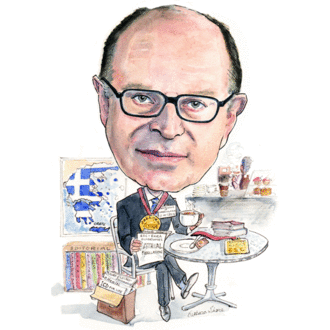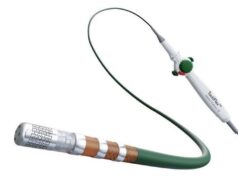
Panos Vardas, president of the European Heart Rhythm Association, is also president-elect of the European Society of Cardiology. In this interview with Cardiac Rhythm News, he spoke on his career, memorable cases, achievements and plans to lead the ESC.
How did you become interested in medicine? Why cardiology?
I was born and raised on a small Greek island. Since my father was a shipmaster, I was expected to have a deep love for and fervent interest in the sea. For various reasons, after graduating from high school, I decided to study a subject that would keep me on land even though my love for travelling and commanding boats was strong. Medicine was not among my first choices. As far as exact sciences were concerned, I considered becoming a chemical engineer while also showing a great aptitude for pure subjects, such as law and philosophy. I eventually opted for medicine, since this field combines humane values with scientific disciplines and technology.
My choice regarding cardiology was much easier. Cardiology, and cardiovascular medicine in a wider sense, is a steadily evolving specialty, which combines mechanics and electrics, as the doctor is often able to detect the patient’s improvement within minutes or even seconds.
It is a splendid specialty. The fact that contemporary cardiology has offered patients an extension of life of about eight years-in contrast to oncology offering an extension of life of just a few months despite prodigious investments-cannot be considered as fortuitous.
Who inspired you in your career and what advice of theirs do you remember today?
I started my career as a young trainee in cardiology at the Clinical Therapeutics clinic of the University of Athens under Professor S Moulopoulos, an academic who was keenly interested in research and training. In such a promising environment, I was able to carry out my first research work.
Then I went to Westminster Hospital in London, where I specialised in arrhythmia, electrophysiology and pacing. In addition, I proceeded to my PhD in clinical electrophysiology at the Charing Cross and Westminster Medical School of London.
What I learned from my teachers and have treasured throughout the years is the quest for the innovative, along with respect for regulations.
How has the treatment of cardiac arrhythmias evolved since you began your career?
Tremendously. In the beginning of the 80s, when I set out to make a career in clinical electrophysiology and arrhythmias, both cardiac electrophysiology and cardiac rhythm management devices were not adequately evolved. It was about this period that the DC shock ablation to ablate the AV node was presented for the first time. Response rate pacing, implantable defibrillators, radiofrequency ablation and cardiac resynchronisation did not exist then.
Could you describe some memorable cases you have treated?
While there are many memorable cases, I most importantly remember all those older people’s lives which have been transformed thanks to pacemakers from their suffering with symptomatic bradycardia and the significant pessimism associated with it. I clearly remember the time I implanted an ICD in my patient, whose life was later saved at least three times, as he was developing a fast haemodynamically unstable ventricular tachycardia in a ground of dilated cardiomyopathy.
Lastly, I remember two young people who suffered from phobia, stress and insecurity because of frequent events of superventricular tachycardia due to bypass track. These people were restored to health after an ablation and have been happy ever after.
Could you share one of your proudest moments with us?
I feel proud every time I achieve my professional goals or when I see my patients leading a happy family life after having their lives saved by me or my team. In my career, I was really proud during the swearing-in ceremony for my PhD in clinical electrophysiology at London University. Moreover, I was extremely proud quite recently, when I became president-elect of the European Society of Cardiology.
What are your current areas of research?
As head of a large cardiology clinic and supervisor of various research teams, I am in contact with a wide range of research subjects in clinical cardiology. Personally speaking, however, I am mainly engrossed in arrhythmias as well as in atrial fibrillation, cardiac pacing and sudden cardiac death.
What is the most interesting paper you have come across recently?
It is not just one paper, but quite a few. I usually appreciate papers based on well-organised research as well as guidelines. In the last year, the ESC/EHRA guidelines for atrial fibrillation together with an updated report of cardiac resynchronisation in heart failure were published. As a participant, I have a profound knowledge pertaining to the above-mentioned issues.
Which developing techniques and technologies for arrhythmias treatment are you watching closely for the future?
I believe that as subcutaneous defibrillators become smaller, the picture in the primary prevention of ICD will keep changing, thus leading to impressive developments. Meanwhile, the follow-up of CRM devices will become a lot different, as the telemonitoring facilities of these devices are rapidly evolving. The ablation of atrial fibrillation is to evolve even further following the developments in technology regarding imaging as well as catheters.
What are the challenges facing electrophysiology in Europe and also in your country?
Europe is a continent with a great disparity and heterogeneity in healthcare systems, and accessibility of patients to advanced techniques and medical technology. Consequently, the first priority and challenge is to implement the ESC Guidelines related to arrhythmias and electrophysiology in all EIC member countries. Furthermore, a uniform policy in education and training in electrophysiology needs to be developed all around Europe.
What have your biggest achievements as president of the EHRA been?
First of all, I would like to point out that I consider the creation of EHRA itself seven years ago as a major achievement. It was actually during my presidency at the Working Group of Cardiac Pacing that we proceeded to an amalgamation with the working group of Arrhythmias.
As president of the EHRA, an association which makes headway based on conformity in its leadership, I believe that my carrying out of the project ICD for life, which aims at fighting Sudden Cardiac Death in ESC member countries and particularly in those with emerging economies, is in fact an important step.
Moreover, there are a number of projects that have been drawn up during my presidency, such as the one concerning Health Economics and Health Technology Assessment for Cardiac Rhythm Management Devices.
Last but not least, I consider last year’s EHRA policy conference about e Health as innovative and important.
What are your expectations as president-elect of the ESC and then as president after 2012?
As I have repeatedly emphasised, every ESC president mainly aims at seeing successful projects, such as the annual conference, the guidelines and so on, being kept up. As president-elect of ESC, I can see a wide horizon of activities where the first priority is undoubtedly my full co-operation with the president of our society, as co-operation and continuity are essential to its leading team.
During my presidency, the EU Affairs will have a special place as well as all efforts ensuring close co-operation and support by the EU Commission.
Outside medicine, what other interests do you have?
My constantly increasing obligations do not leave much room for pursuits outside the sphere of my main activities.
What I love, however, is a spectrum of areas starting from philosophy, political history and modern management and coming down to fine arts. In my limited free time, I read books by famous authors often with a significant heterogeneity in their writing and ideas. At other times, I enjoy a cup of coffee at a coffee shop carefully chosen in one of the cities I happen to visit. The atmosphere in a coffee shop in the company of a few intellectual and refined people is fascinating for me.
Fact File
Present positions
- Head of the Cardiology Department, University Hospital of Crete, Greece
- Professor of Cardiology, Faculty of Medicine, University of Crete
- President of the European Heart Rhythm Association (EHRA)
Medical education
1974 Medical Degree, Athens University
1982 Specialisation – Internal Medicine, Therapeutics Clinic, University of Athens
1984 Specialisation, Cardiology, Therapeutics Clinic, University of Athens
1985–1989 Post graduate studies abroad – Westminster Hospital, London, UK, Clinical Electrophysiology, Pacing and Interventional Cardiology
Greek scientific distinctions
2002–present Editor of the Hellenic Journal of Cardiology
2003–2007 Dean of the Faculty of Medicine at the University of Crete
2001–2003 Vice Dean of the Faculty of Medicine at the University of Crete
1999–2001 President of the Hellenic Society of Cardiology
International scientific distinctions
2010–present President-elect of the European Society of Cardiology
2009–present President of EHRA
2007–2009 President-elect of EHRA
2007–present Supplements editor of the Europace Journal
2007–present Editor of Cardiology Management
2004–2006 Vice president of the European Society of Cardiology, for National Societies
2002–2006 Member of the Board of the European Society of Cardiology
2002–2003 Chairman of the European Working Group of Cardiac Pacing & Electrophysiology
2002–2006 Chairman of the ESC Sub-Committee on Educational Tools
Research and authorship
Publications in Medline – 307 (under “Vardas P”)
Author of a number of books and chapters in books
Editorial board member and/or reviewer
Archives of Medical Science (AMS), European Heart Journal, HEART, Journal Pacing Clinical and Electrophysiology (PACE), European Journal of Pacing Arrhythmias and Cardiac Electrophysiology (Europace), Progress in Biomedical Research, Cardiovascular Drugs and Therapy, CHEST, Circulation, Clinical Science, Nature Clinical Practice Cardiovascular Medicine, International Journal of Cardiology, Journal of the American College of Cardiology, Journal of Human Hypertension, Coronary Artery Disease, and Heart and Vessels.









